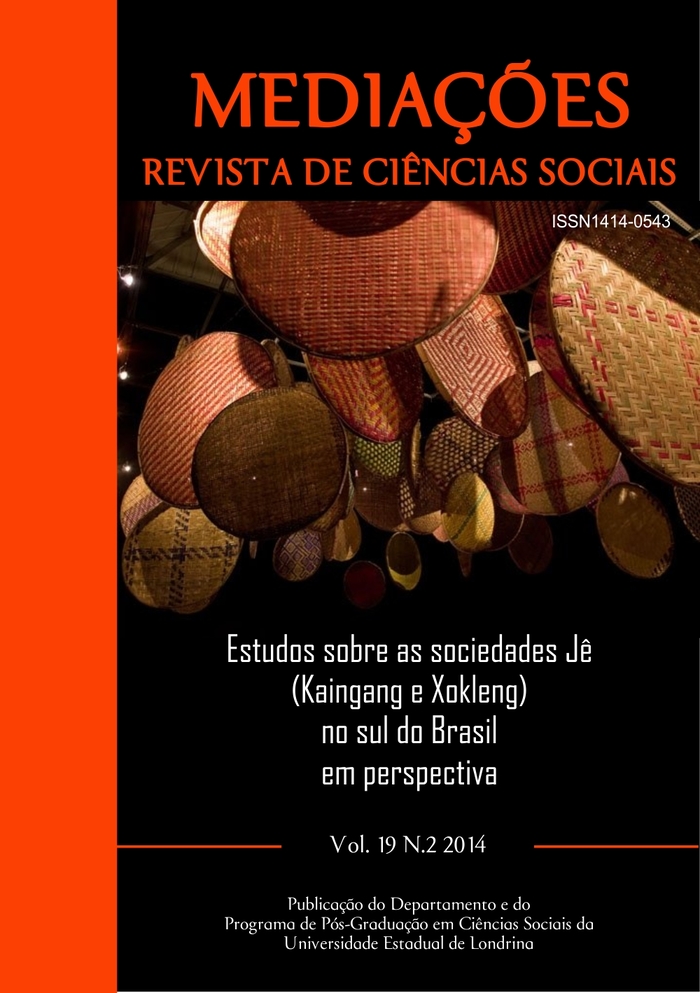Kaingang territories and territorialities: the postconquest reivention of spaces and forms of survival
DOI:
https://doi.org/10.5433/2176-6665.2014v19n2p18Keywords:
Kaingang territories, Kaingang territorialities, Indigenist politics, Urban villagesAbstract
This article explicates the ways in which, postconquest, the Kaingang have faced decisive situations that have forced them to seek new forms of survival in the lands demarcated by the government. These lands, which have drastically diminished in size over the second half of the twentieth century, were stripped of the natural resources that guaranteed the Kaingang’s survival. Analysis of this process revealed that the Kaingang were obliged to construct a new time (uri), as opposed to the old time (vãsy). The Kaingang maintained their territorialities according to their customary ways, despite their being in permanent conflict with the prescribed codes. As such, the territorialisation movement of the Kaingang is transposed upon the territorialities of a capitalist society founded on private property.Downloads
References
TERRITÓRIOS E TERRITORIALIDADES KAINGANG... K. TOMMASINO E L. K. DE ALMEIDA 41 ALMEIDA, Ledson Kurtz de. Relatório do componente indígena da duplicação da BR 386. Brasília: DNIT, 2009.
AMBROSETTI, Juan B. Los índios Kaingángues de San Pedro (Misiones). Compañía Sud-Americana de Billetes de Banco. Revista del Jardin Zoológico de Buenos Aires, Tomo II, 1895.
BALDUS, Herbert. Ensaios de etnologia brasileira. São Paulo: Nacional, 1979.
BORBA, Telêmaco. Atualidade indígena. Curitiba: Impressora Paranaense, 1908.
BREMEN, Volker von. Fuentes de Caza y Recolección Modernas. Sttudgard, 1987.
CARVALHO, Edgard Assis (Org.). Antropologia Econômica. São Paulo: Livraria Editora Ciências Humanas Ltda. 1978.
CORREIA, Jáder Figueiredo. (Coord.). Relatório da Comissão de Inquérito incumbida de apurar as irregularidades do SPI. Rio de Janeiro, 1967.
CRÉPEAU, Robert R. Les Kaingang dans le context des études Jê et Bororo. Anthropologie et Societés, Quebec, v. 21, n. 2-3. 1997.
LÉVI-STRAUSS, Claude. Tristes trópicos. Lisboa: Livraria Martins Fontes/Portugal, 1955.
MABILDE, Pierre François A. B. Apontamentos sobre os indígenas selvagens da nação Coroados dos matos da Província do Rio Grande do Sul. São Paulo: IBRSA/INL, 1983.
MOTA, Lúcio Tadeu. Os índios Kaingang nos campos do Brasil meridional na metade do século passado. In: MOTA, Lúcio Tadeu; NOELLI, Francisco S.; TOMMASINO, Kimiye (Org.). Uri e Wãxi: estudos interdisciplinares dos Kaingang. Londrina: EDUEL, 2000.
RAMOS, Alcita Rita. Sociedades indígenas. São Paulo: Ática, 1986.
SAHLINS, Marshall. Sociedades Tribais. Rio de Janeiro: Zahar, 1974.
SAHLINS, Marshall. Ilhas de história. Rio de Janeiro: Zahar, 1990.
TOMMASINO, Kimiye. A história dos Kaingang da Bacia do Tibagi: uma Sociedade Jê Meridional em Movimento. 1995. 348 fls. Dissertação (Doutorado em Antropologia) - Universidade de São Paulo, São Paulo, 1995.
TOMMASINO, Kimiye. Os novos acampamentos (vãre) kaingang na cidade de Londrina: mudança e persistência numa sociedade jê. Revista Mediações, Londrina, v. 3, n. 2, jul.- dez. 1998.
TOMMASINO, Kimiye. Oficina de Antropologia Econômica: Dinâmica histórica da economia kaingang – século XIX-XXI. Londrina, 19 de novembro de 2010.
TOMMASINO, Kimiye; MOTA, Lúcio Tadeu. As cidades e os Kaingang no Paraná. In: REUNIÃO BRASILEIRA DE ANTROPOLOGIA, 23, 2002, Gramado. Anais da vigésima terceira Reunião brasileira de antropologia, Gramado, 2002.
WIESEMANN, Ursula. Dicionário Kaingáng – Português, Português – Kaingáng. Brasília: Summer Institute of Linguistics, 1981.
Published
How to Cite
Issue
Section
License
Copyright on articles published in Mediações belongs to the author(s): in the case of partial or entire republication of the original publication, we ask author(s) to indicate the original publication in the periodical.
Mediações uses the Creative Commons Attribution 4.0 International license, which allows Open Access, enabling any user to read, download, copy and disseminate its content so long as adequately referenced.
The opinions expressed by the author(s) are their sole responsibility.
































